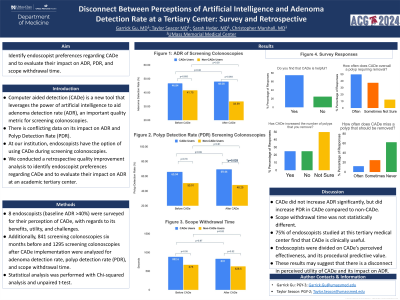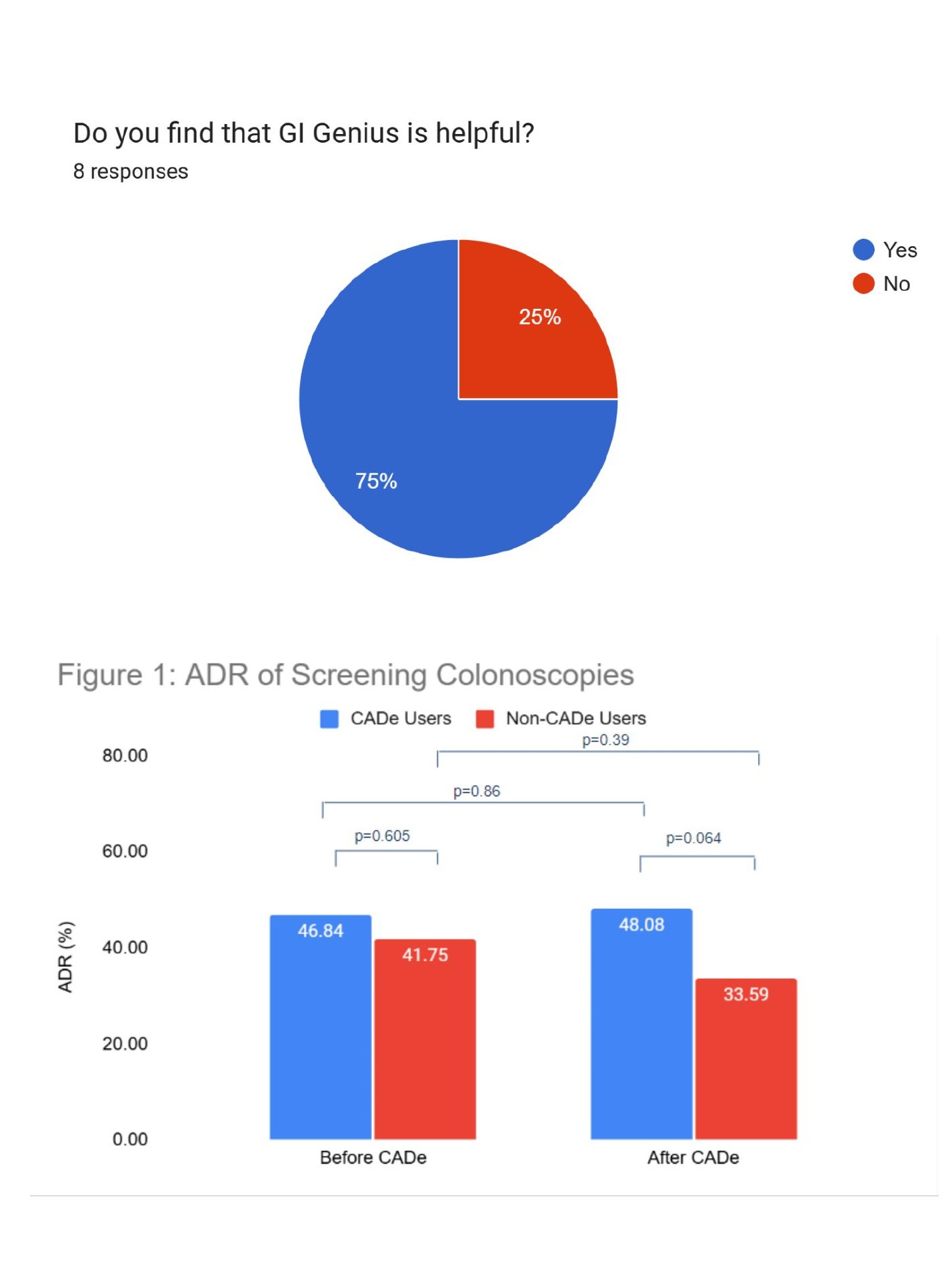Tuesday Poster Session
Category: Colorectal Cancer Prevention
P3862 - Disconnect Between Perceptions of Artificial Intelligence and Adenoma Detection Rate at a Tertiary Center: Survey and Retrospective
Tuesday, October 29, 2024
10:30 AM - 4:00 PM ET
Location: Exhibit Hall E

Has Audio

Garrick H. Gu, MD
University of Massachusetts
Worcester, MA
Presenting Author(s)
Garrick Gu, MD, Taylor Seacor, MD, Sarah M. Hyder, MD, MBA, Christopher Marshall, MD
University of Massachusetts Memorial Medical Center, Worcester, MA
Introduction: Computer aided detection (CADe) is a new tool from Medtronic that leverages the power of artificial intelligence to aid adenoma detection rate (ADR), an important quality metric for screening colonoscopies. At our institution, endoscopists have the option of using CADe during screening colonoscopies. We conducted a retrospective quality improvement analysis to identify endoscopist preferences regarding CADe and to evaluate their impact on ADR at an academic tertiary center.
Methods: 8 endoscopists (baseline ADR >40%) were surveyed for their perception of CADe, with regards to its benefits, utility, and challenges. Additionally, screening colonoscopies six months before and after CADe implementation were analyzed for adenoma detection rate, polyp detection rate (PDR), and scope withdrawal time. Statistical analysis was performed with Chi-squared analysis and unpaired t-test.
Results: 6 of 8 endoscopists found CADe helpful and used it for >90% of screening colonoscopies. Nearly all endoscopists in the study felt that the software often overcalled polyps requiring removal. On the other hand, most endoscopists felt that CADe did not usually miss a clinically significant polyp. 841 colonoscopies were included in the pre-CADe group, and 1295 colonoscopies were included in the post-CADe sample. There was no difference in ADR for screening colonoscopies between CADe users before and after implementation (0.86). Additionally, there was no difference in ADR between CADe users and non-CADe users before or after implementation (p=0.064). There was a significant difference in PDR between CADe users and non-CADe users after implementation (p=0.028). Scope withdrawal time was not significantly different between before and after implementation in either CADe users and non-CADe users.
Discussion: 75% of endoscopists studied at this tertiary medical center find that CADe is clinically useful. However, our data potentially shows that CADe increases polyp detection without improving ADR. Scope withdrawal time was not affected by CADe. These results indicate that there is a disconnect in perceived utility of CADe and its impact on PDR and ADR. Endoscopists with high baseline ADR may elect to use this technology in an attempt to actively improve their ADR.

Disclosures:
Garrick Gu, MD, Taylor Seacor, MD, Sarah M. Hyder, MD, MBA, Christopher Marshall, MD. P3862 - Disconnect Between Perceptions of Artificial Intelligence and Adenoma Detection Rate at a Tertiary Center: Survey and Retrospective, ACG 2024 Annual Scientific Meeting Abstracts. Philadelphia, PA: American College of Gastroenterology.
University of Massachusetts Memorial Medical Center, Worcester, MA
Introduction: Computer aided detection (CADe) is a new tool from Medtronic that leverages the power of artificial intelligence to aid adenoma detection rate (ADR), an important quality metric for screening colonoscopies. At our institution, endoscopists have the option of using CADe during screening colonoscopies. We conducted a retrospective quality improvement analysis to identify endoscopist preferences regarding CADe and to evaluate their impact on ADR at an academic tertiary center.
Methods: 8 endoscopists (baseline ADR >40%) were surveyed for their perception of CADe, with regards to its benefits, utility, and challenges. Additionally, screening colonoscopies six months before and after CADe implementation were analyzed for adenoma detection rate, polyp detection rate (PDR), and scope withdrawal time. Statistical analysis was performed with Chi-squared analysis and unpaired t-test.
Results: 6 of 8 endoscopists found CADe helpful and used it for >90% of screening colonoscopies. Nearly all endoscopists in the study felt that the software often overcalled polyps requiring removal. On the other hand, most endoscopists felt that CADe did not usually miss a clinically significant polyp. 841 colonoscopies were included in the pre-CADe group, and 1295 colonoscopies were included in the post-CADe sample. There was no difference in ADR for screening colonoscopies between CADe users before and after implementation (0.86). Additionally, there was no difference in ADR between CADe users and non-CADe users before or after implementation (p=0.064). There was a significant difference in PDR between CADe users and non-CADe users after implementation (p=0.028). Scope withdrawal time was not significantly different between before and after implementation in either CADe users and non-CADe users.
Discussion: 75% of endoscopists studied at this tertiary medical center find that CADe is clinically useful. However, our data potentially shows that CADe increases polyp detection without improving ADR. Scope withdrawal time was not affected by CADe. These results indicate that there is a disconnect in perceived utility of CADe and its impact on PDR and ADR. Endoscopists with high baseline ADR may elect to use this technology in an attempt to actively improve their ADR.

Figure: Key Data in Gastroenterologist Preference, and ADR
Disclosures:
Garrick Gu indicated no relevant financial relationships.
Taylor Seacor indicated no relevant financial relationships.
Sarah Hyder indicated no relevant financial relationships.
Christopher Marshall indicated no relevant financial relationships.
Garrick Gu, MD, Taylor Seacor, MD, Sarah M. Hyder, MD, MBA, Christopher Marshall, MD. P3862 - Disconnect Between Perceptions of Artificial Intelligence and Adenoma Detection Rate at a Tertiary Center: Survey and Retrospective, ACG 2024 Annual Scientific Meeting Abstracts. Philadelphia, PA: American College of Gastroenterology.

